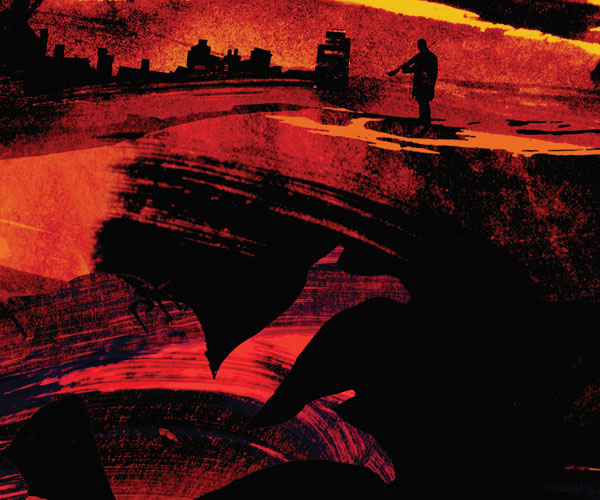‘The Assassination of Margaret Thatcher’, by Hilary Mantel

Simply sign up to the Life & Arts myFT Digest -- delivered directly to your inbox.
What a fabulously nasty concoction Hilary Mantel has served up in The Assassination of Margaret Thatcher, her first collection of short stories for 11 years. It’s a fugu fish of a book; parts of which will leave you dizzily elated, while other parts may make you very ill indeed, and I’m not talking about the murder of that PM either, for the title story is a little masterpiece of sinister glee. Of course there’s plenty of devilment in her Thomas Cromwell saga too, but it gets absorbed into the great historical bloodstream coursing through her work. In the short stories, the venom is distilled, bottled and dripped like slowly staining bitters into the cocktail of the entertainment.
Sometimes Mantelism – the gleeful close-up inspection of disaster, cruelty and sickness – can be overdone. The two young girls in “Comma” spy on a bundle, the inert shape of that punctuation mark, being wheeled around in the grounds of a neighbouring mansion. Finally they get a glimpse of what the comma really is: “we saw something not a face but perhaps, I thought, when I thought about it later, perhaps a negotiating position for a face, perhaps a loosely imagined notion of a face, like God’s when he was trying to form us; we saw a blank; we saw a sphere, it was without feature, it was without meaning, and its flesh seemed to run from the bone.” We get it. But then we’ve already got it with the brilliant “negotiating position for a face”. The rest is strictly for the gag reflex. So the pile-up undoes itself, sending horror into the territory of merely horrid.
Sometimes she miscalculates the economy of mischief. It is when the husband, feeling his oats and feeling up an available partygoer in the kitchen, is suddenly caught at it by the wife who is looking after the guests in a more conscientious way – “her bare arms were drooping stems and glasses like fruit hung from her finger ends” – that the shock hits, not the B-movie aftermath.
In the strongest stories, nothing especially sensational happens at all, except a gathering of stifling gloom, experienced by characters who only dimly comprehend what is happening to them, often because the narrator is gripped by malaise, migraine, medicines and waking hallucinations. In one of the shortest, spookiest and best, “Terminus”, a passenger on an incoming train at Clapham Junction thinks she sees her dead father in the carriage of another train on parallel tracks. “It came to me that he had looked younger as though death had moved him back a stage.” The ghost train moves off and she spends the rest of the story hunting for him amid the flood of commuters at Waterloo, “a stone in the rude stream, as the travellers crashed and surged around me”. The station is described with unsparing vividness: the chilled cabinets with their “embalmed meals for travellers”.
When she summons voices and paints urban scenery, especially of the brown-grey-pebble-dashed hinterland of Britain, Mantel is perfection; “Sorry to Disturb”, though, catches the airless claustrophobia of apartment life in Jeddah with hellish credibility, a place where only the skitter of cockroaches breaks the silent tedium. Throughout the collection, the voices – a Pakistani businessman; the female staff of a Harley Street clinic; and the Irish assassin at once droll and nervous – are all perfectly pitched.
Mantel has let it be known that killing off the PM did occur to her as a kind of wicked reverie when she was occupying the Windsor flat in which she installs her narrator and the visiting sniper she has mistaken for her plumber. Somehow this is not a surprise, and any pretend distance between the fictitious narrator and her author disappears altogether in the sharp-toothed characterisation of the hated Thatcher with her “tippy-tap” toddling walk. “I thought, there’s not a tear in her” (she is just emerging from optical surgery), “Not for the mother in the rain at the bus stop, or the sailor burning in the sea. She sleeps four hours a night. She lives on the fumes of whisky and the iron in the blood of her prey.”
That title story, wickedly good, is alone worth the price of admission to the book. But the great tour de force of the collection, “How Shall I know You?”, is its complete temperamental opposite: a ghastly trip made by a demoralised biographer, already feeling unwell, to an unnamed dockland town where she is to speak to a literary society. The standard features of Mantelian gothic are all here: the secretary is called Mr Simister; the receptionist of the author’s B&B, Eccles House, is a diminutive twisted thing desperate to please while one of her eyelids dances in jerky spasms. The sheer reek of the place draws from Mantel a passage of sublime nausea: “I stood and breathed in – because one must breathe – tar of ten thousand cigarettes, fat of ten thousand breakfasts, the leaking metal seep of a thousand shaving cuts, and the horse chestnut whiff of nocturnal emissions.”
Think about it for a minute and you realise that those conkers are bonkers. But we don’t care. The storyteller is so devilishly good, we follow her gaily into the steaming loathsomeness of Eccles House with a smile on our face, the very reflection of Hilary Mantel’s own demonic grin.
‘The Assassination of Margaret Thatcher’, by Hilary Mantel, Fourth Estate, RRP£14.99/ Henry Holt & Co, RRP$27, 256 pages
Simon Schama is an FT contributing editor
Illustration by Simon Pemberton
Comments